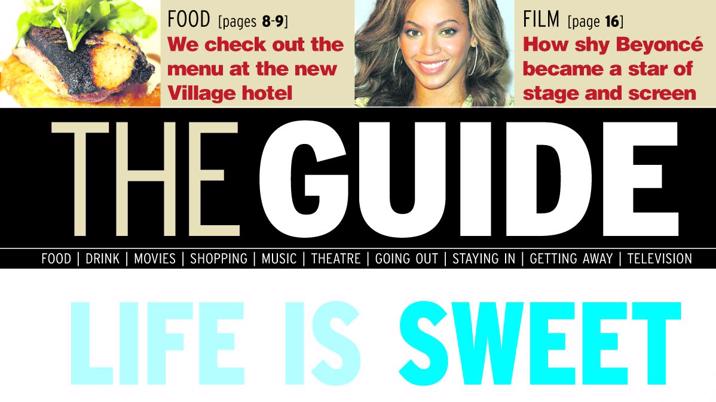
Research continually tells us that one reason people buy a newspaper is for the What’s On guide. Every research document I have ever seen for a newspaper, and there have been many, has placed the entertainment section high up the must-have list.
Indeed some research goes further. A good entertainment guide, loaded with information and advice on how to spend your leisure time, is the likeliest way to attract the increasingly elusive 25 to 44-year-olds.
As a result of this accepted mantra, local and regional newspapers devote pages of newsprint – often unsullied by advertisements - to their leisure guides. They come in various guises – including Weekend(er), Box Office, The Guide, Going Out, Spectrum, 24/7, Seven Days, Day and Night, Ticket, Choice and Culture. It all means What’s On but there is a clear belief that a "cool" name is essential if these potential youngish readers are to place the local paper, alongside Zoo and Heat, on their essential reading list.There is, of course, little evidence that these supplements have done anything for the sale. Where are the masses of party animals, eagerly anticipating the arrival of Friday’s Posts and Chronicles?
Well, the ABC figures (and the ad revenues) appear to be sending a clear signal that maybe the What’s On sections are in need of a rethink.
A few years ago, my company was asked to write a report on the way regional newspapers handled their leisure and entertainment guides. We examined some 300 newspaper guides worldwide – and ended up fairly underwhelmed.
Many newspapers have failed to merge their web and print leisure service effectively.
Separate staying in from going out
The first mistake that newspapers appear to make is to fail to understand who the publication is aimed at. One had the slogan: "The definitive guide to going out in (name of town deleted to protect the guilty)" and on the cover was a picture of an elderly couple showing off their lush garden. If you are producing a bulb catalogue, this approach may be fine … but if you are seeking to bring in the party-set it is a flawed idea.
Many of the supplements we saw were little more than a dumping ground for anything loosely connected with relaxation. Bridge, gardening, recipes, chess, a handful of CD reviews, a few acerbic comments on the local players’ production of the Mikado and interminably long lists of events, are not going to get the local fashionistas down to the newsagents on a wet Friday afternoon.
The supplements need to have different tone. Newspapers such as the Glasgow Herald accepts that going out to cinemas, pubs and clubs is not the same as spending your weekends on country rambles or attending to your dahlias – and have separate supplements, with different attitudes, to confirm it.
And why do we lump staying in with going out? They are different experiences. Most newspapers think it is logical to put DVD reviews and cinema information next to each other. Why? One is about going out, perhaps taking in a restaurant, finding out if the bar will still be open after the film has finished and sorting the last bus / taxi home. The other is about takeaways, recipes and the best supermarket beer offers.
Many of the supplements were little more than a dumping ground for anything loosely connected with relaxation.
Use the web for listings
Many newspapers have also failed to merge their web and print leisure service effectively. Last year I had discovered that Cream were reforming to play at the Albert Hall. By the time I first read about it in a newspaper, I had gained all the details I needed and booked my tickets online. How many newspapers really use the mix of print and web to help their readers stay ahead of the game? All too often, by the time readers find out about it in the newspaper, the tickets are long gone.
Why don’t newspapers continually update their websites – building up a reputation as the place to find out when and where tickets are on sale as soon as it is announced?
Local newspapers also need to remember that their readers are prepared to venture outside of their patch for entertainment. How many offer, for example, a guide to the West End shows, where to get tickets, what trains to catch, budget hotels and recommended nearby restaurants?
Many newspapers also underuse the web when it comes to listings. Listings are the lifeblood of the entertainment sections. However, running screeds of 6pt in day-by-day order is little more than a waste of newsprint … space that could be used for something far more interesting.
Readers do not want to plough through the whist drives and car boot sales to find the elusive blues band they have been waiting to see. Nor do they plan their leisure time by saying – "it is Monday. Let’s see what’s on and go somewhere." Listings should be surely run in subject order – music, theatre, exhibitions etc and then by date. They should include useful information – reviews, transport details, car parking, maps, phone numbers, websites and disabled access.
The real point about listings, though, is that they need to be accurate, up to date and comprehensive. The truth is that, before the paper hits its last edition deadline, the listings are already out of date.Why not use the paper as the guide - the seven most interesting things to do this week – with comments, pictures and a cross reference to the ultimate local listings guide on the website? This online guide would be unfettered by space restrictions, updated hourly and searchable by key words.
Before the paper hits its last edition deadline, the listings are already out of date.
Offer an opinion
Offering genuine guidance and opinion is not something many newspapers outside of the nationals and bigger regionals are keen on. There is a mass of information out there already, so what the reader needs is a bit of help, a bit of advice. When considering taking my children to see Cars over the summer holidays, I solicited the views of those trusted friends who had already been. I would like my local paper to be one of those trusted friends.
Seven things to do with the family this week, seven things to do if you are flying solo, the best three music gigs of the week – all with an informed and entertaining narrative – would be far more appealing than the dreary articles and poorly spaced 6pt listings that adorn many a local paper.
What also emerged, as we pored over our 300 titles, was that many of those who did offer opinions were moonlighting hacks who had cornered the free CDs or books in the office. There were plenty of archetypal ageing Oasis fans choosing to review only those CDs they liked or wittily slagging off the Lostprophets, Black Eyed Peas or Lily Allen simply because they do not fall in their sphere of AOR. Little wonder credibility among the under 35s is in tatters.
Why not offer the readers a voice? Offer those with their fingers on the pulse a forum on the web or in print – or both. "Want to hear what our readers think about the Puppini Sisters’ album? There are 50 reviews on our website ... why not add your own?" The same could apply to new films, books and restaurants (although care would be needed). Newsday, in New York, has a Review Crew page – readers giving a daily dose of opinions on everything from TV programmes to film premieres. The Norwich Evening News solicits opinions outside cinemas and runs them with photographs and star ratings. The Times does something similar outside West End theatres. But it is just a start. Time Out hands the editorship of particular issues over to guests such as Nick Hornby. Something the local paper could adapt?
One of my other beefs is that many of the entertainment guides just aren’t, well, … entertaining.
Make it entertaining
One of my other beefs is that many of the entertainment guides just aren’t, well, … entertaining. We came across Victor Lewis Smith reviewing a restaurant in the Guardian: "The food looked exactly as it did on the laminated menu, and therein lay the central problem. It even tasted laminated being coated with stale vegetable oil that acted as a barrier between it and my tongue. Two insipid eggs, two rashers of unsmoked bacon, two tomatoes, two slices of toast (doubtless from a 40-foot long sliced cotton wool loaf) and two sad, sad sausages, surely the wurst I have ever eaten, with less flavour than roadkill stuffed into a condom."
Of course a local newspaper could not be so cavalier in its comments about potential customers, but that does not mean it should abandon good writing and humour altogether.
Eating Out is another area – and one with revenue potential – that is very hit and miss. The Glasgow Herald’s Eating Out section certainly looks like it means it. The one we looked at for our review had a spread devoted to "five places to find the perfect pudding," along with tasting notes and another page of pub reviews. But it was the exception. Amazingly, food and drink are almost ignored by some.
One thing that must irritate serious diners is the one lonesome and often bland weekly review. What if they don’t fancy that particular restaurant tonight? It would seem fairly fundamental that the backlog of previous reviews should be posted on the website for readers to browse through.
There is much more to the subject of leisure guides than can be covered in a 1,600-word article. If I had the space I could rant about shopping, rated as one of the favourite leisure pursuits, particularly among women, and yet newspapers choose to largely ignore it.
There are some newspapers that have recognised these points already. In this year’s Regional Press Awards I was a judge in the supplements section. The offerings from the shortlisted six including the Nottingham Evening Post, the Gloucestershire Echo and the outstanding winner – the Hull Daily Mail’s The Guide – were first rate.
For much of the rest I offer some key questions: What is your leisure guide for? Who is it aimed at? Do you speak the same language as those you are trying to attract? Do you offer well-informed advice? Are your listings genuinely useful? What platform do you offer your readers? Do you use a mix of online services and print to build a definitive guide to what’s on in your patch? And do your critics touch a nerve with your audience ... or is it time to take a serious review of the reviewers?












